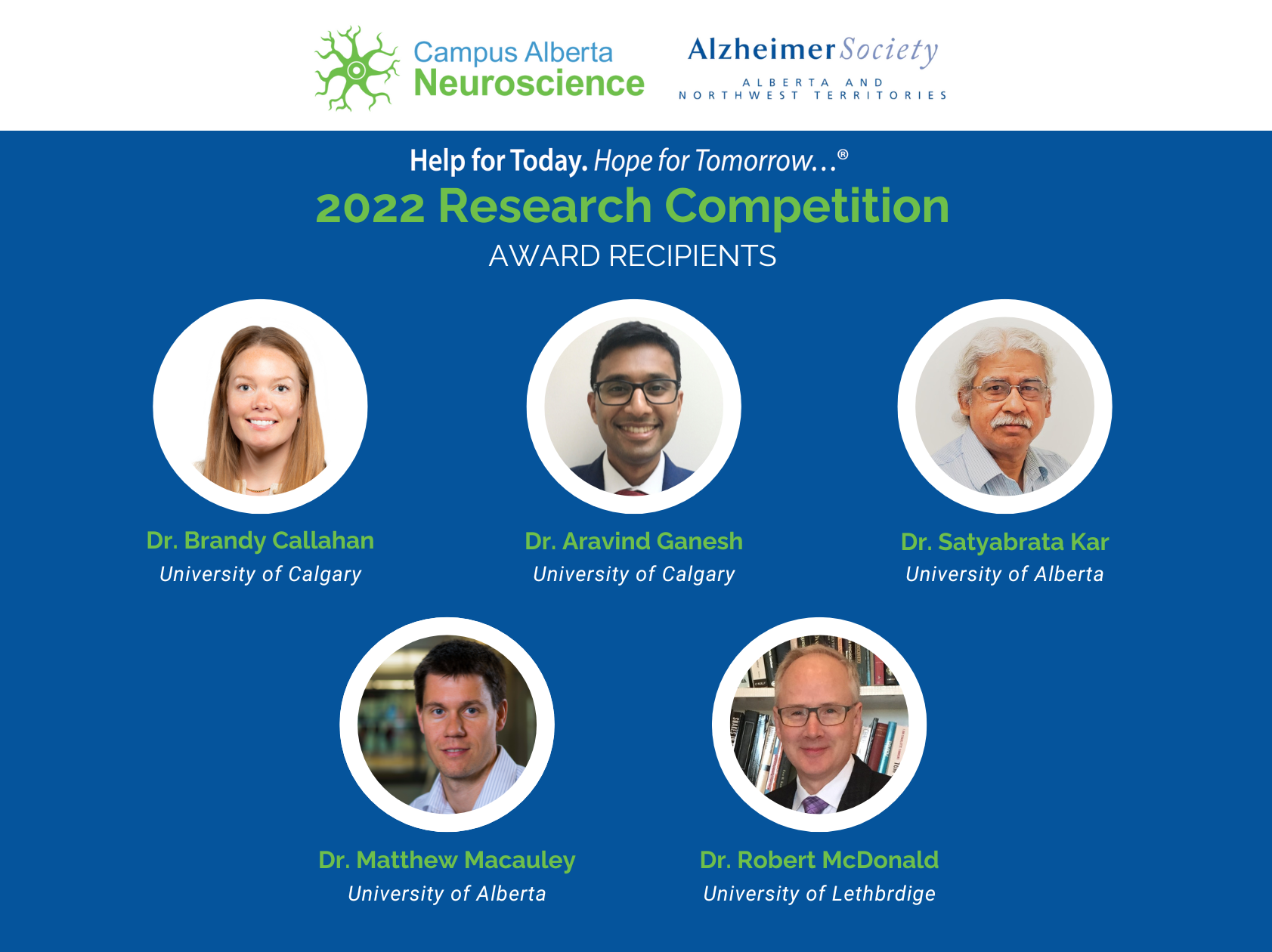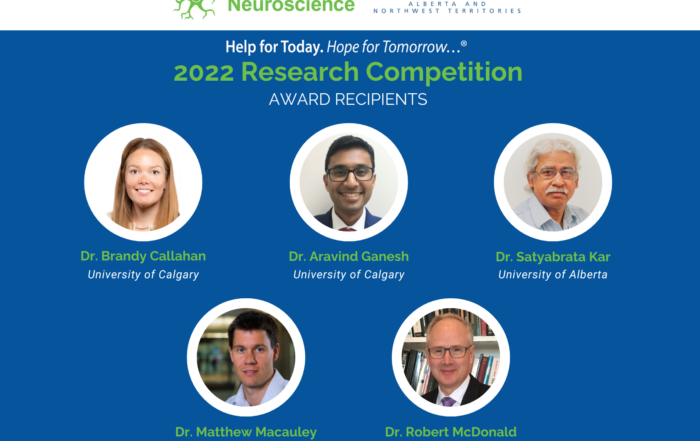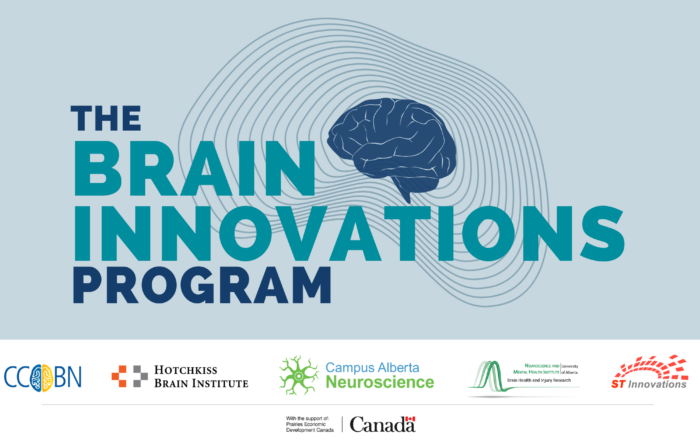The first year of the Hope for Tomorrow Research Competition will see just over $1 million CAD in funding distributed to five outstanding Alzheimer’s and dementia research projects in Alberta, facilitated by a partnership between the Alzheimer Society of Alberta and Northwest Territories (AS AB/NT) and Campus Alberta Neuroscience (CAN).
August 28, 2023
$1 million awarded to five Alzheimer’s research projects at Alberta universities for inaugural Hope for Tomorrow Research Competition

The Alzheimer Society of Alberta and Northwest Territories and Campus Alberta Neuroscience are pleased to announce this year's awardees.
The first year of the Hope for Tomorrow Research Competition will see over $1 million CAD in funding distributed to five outstanding Alzheimer's and dementia research projects in Alberta, facilitated by a partnership between the Alzheimer Society of Alberta and Northwest Territories (AS AB/NT) and Campus Alberta Neuroscience (CAN).
Awardees
AS AB/NT and CAN are pleased to announce the principal investigators and their projects funded by the first Hope for Tomorrow Research Competition:
- Dr. Brandy Callahan - University of Calgary
Investigating pathways driving dementia risk in adults with ADHD
Dr. Callahan's research will examine how challenges and stress in the lives of people with ADHD contributes to their risk for cSVD, a cause of vascular dementia, allowing for early diagnosis and intervention strategies for high-risk populations.
- Dr. Aravind Ganesh - University of Calgary
Patient-centred refinement and testing of a system for remote ischemic conditioning to protect cognition and quality of life in vascular and mixed dementia
Dr. Ganesh's team, with doctor and patient partners, will develop and test a new, easy-to-use device that overcomes important limitations of current devices used for remote ischemic conditioning - a promising therapy for leading causes of dementia.
- Dr. Satyabrata Kar - University of Alberta
Biodegradable PLGA nanoparticles attenuate Aβ-induced aggregation/phosphorylation of tau protein: Implications for the treatment of Alzheimer's disease
Dr. Kar's team will be studying PLGA nanoparticles as a potential way to prevent memory impairment by stopping the interaction of proteins believed to cause brain cell death, for a possible future treatment for Alzheimer's patients.
- Dr. Matthew Macauley - University of Alberta
Leveraging the Gain-of-Function Alzheimer's Protective Role of CD33
Dr. Macauley's team aims to enhance the brain's immune cells to fight against build-up of neurodegenerative plaques by finding ways to increase production of a rare but helpful protein, CD33, as a potential to treat or even prevent Alzheimer's.
- Dr. Robert McDonald - University of Lethbridge
Novel rodent models of the sporadic version of Alzheimer's disease: development, characterization, and prevention
Dr. McDonald's research studies two gene mutations and a combination of co-factors thought to contribute to sporadic Alzheimer's disease to see how they interact with each other and how the negative effect might be lessened with lifestyle changes.
Hope for Tomorrow Research Competition
Launched in September of 2022, the Hope for Tomorrow Research Competition supports top neuroscience researchers in high priority areas concerning Alzheimer's and dementia. This first iteration ran under the theme "Quality of Life", supporting projects with potential to have a significant impact on the lives of people with Alzheimer's and dementia in Alberta, and beyond.
The competition will be an annual occurrence with the second application cycle opening on September 21, 2023.
For more information on the Hope for Tomorrow Research Competition, please visit the competition webpage.
About AS AB/NT
The Alzheimer Society of Alberta and Northwest Territories is working to change the face of dementia and improve the quality of life for those with the disease. Serving Alberta and the Northwest Territories, the Society offers a network of educational and support services for people diagnosed with dementia and their care partners, builds partnerships with health professionals and the community and advances research into effective treatments and finding a cure for this devastating disease. To learn more about Alzheimer’s, dementia, and the work done by AS AB/NT, please visit alzheimer.ab.ca.
About CAN
Campus Alberta Neuroscience, established in 2012 with support from the Government of Alberta, is a province-wide neuroscience network connecting the Universities of Alberta, Calgary and Lethbridge to increase the impact of neuroscience and mental health research, education and translation, developing the province as an epicenter for neuroscience excellence. Through collaborative partnerships with researchers, government and health system stakeholders, industry and community organizations, CAN supports and accelerates innovative brain and mental health advances that improve brain health, patient care and quality of life in Alberta and beyond. For more information, please visit albertaneuro.ca.


